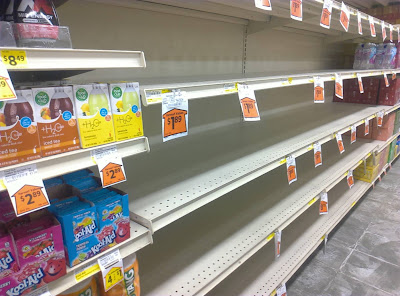-
Collapse incoming: European nations start RATIONING food and fuel

(Natural News) Countries all over the world, especially in Europe, have started implementing policies that ration food and fuel.
Europe’s struggles with its food and fuel supplies began after most nations on the continent imposed economic sanctions on Russia following its invasion of Ukraine. This threatened the flow of already-critical commodities in Europe and threatened to collapse already-struggling global supply chains.
As a result, the prices of everything from oil to wheat have soared, leading to multi-decade high inflation rates. Supplies of these essential products have also dwindled after exports from Russia were completely strangled.
Sunflower oil, wheat, dairy and gas are being rationed
In Spain, the country started experiencing sporadic shortages of different products like eggs, milk and other dairy products almost immediately following the outbreak of the war in Ukraine. In early March, major supermarkets like Mercadona and Makro began rationing sunflower oil.
Spain’s left-wing government even went further and gave stores the option to temporarily impose limits on the number of certain products customers purchase.
In Greece, at least four national supermarket chains have started rationing food products like flour and sunflower oil due to critically low supplies caused by the crippled supply chains coming out of Russia and Ukraine.
The supermarkets claim the current rationing is only a preventive measure that will be rolled back once Greece’s supplies of flour and sunflower oil stabilize. Around 30 percent of Greece’s wheat imports come from Russia and Ukraine.
The reason for the cap on these products is only precautionary, as our customers are concerned about the war in Ukraine,” said one official from supermarket chain Alfa-Beta Vassilopoulos. “We want to ensure we will be able to serve our customers’ needs in the future too.”
“Flour and sunflower oil are the two products which, apart from energy, the war has affected more than anything else,” said Greek Minister for Development and Investment Adonis Georgiadis. “There are already shortages throughout Europe.”
In Germany, the nation triggered the first part of a three-stage emergency plan to conserve the country’s natural gas supply. This move came after Russian President Vladimir Putin demanded that Germany pay for Russian gas in rubles in an attempt to twist Western sanctions against Russia.
The first stage of the emergency plan will lead to “targeted” shutdowns of the flow of natural gas to “specified individual large consumers.”
German Vice-Chancellor and Minister for Economic Affairs Robert Habeck explained that the current rationing plan is a preventive measure implemented to make sure the country doesn’t experience a critical shortage.
Germany is also attempting to reduce or outright eliminate its dependence on Russian gas. Before the war, 55 percent of Germany’s natural gas came from Russia. Now, that number has been reduced to 40 percent with the help of natural gas flows from the Netherlands, France and Belgium.
Food and fuel rationing a consequence of globalism
“The collapse is on … and no signs of slowing down anytime soon,” said Harrison Smith of InfoWars. “In fact, all evidence points to the contrary. It points to those in charge and with the ability to prevent the downside doing everything they can to exacerbate and perpetuate the total collapse of the world economy, particularly in Western countries.” (Related: Gas rationing, food vouchers and hunger are now being normalized for the war phase of the plandemic.)
Smith, the host of “American Journal” on InfoWars, noted that if the global economy wasn’t so dependent on imports from other nations, the war in Ukraine would not have caused such a massive problem for the food and fuel supplies of other nations.
“All of this is really just predicated on globalism. It wouldn’t really be that big of an issue if we didn’t get our toilet paper from China,” he said. “If some ship running aground in the Suez Canal, quite literally on the polar opposite side of the world, somehow makes it so that I can’t buy toilet paper … that’s a problem, and it’s a problem in our world structure.”



Login or Register to Leave a Comment